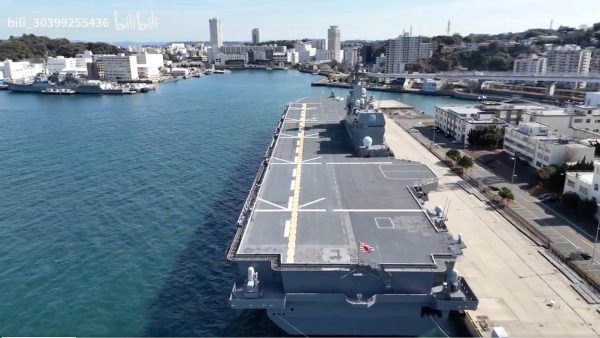A video allegedly shot by a Chinese drone flying over Japan’s largest warship since World War II, JS Izumo, has been spreading on social media platforms in China and elsewhere, prompting the Japanese Defense Ministry and the Japan Maritime Self-Defense Force (JMSDF) to start an official investigation into its authenticity.
The 19-second video and accompanying photos of JS Izumo were uploaded to video-sharing platform bilibili on March 26 by a user with a Chinese name claiming they’d been recorded by drone at the JMSDF Yokosuka Base in Kanagawa Prefecture, south of Tokyo and home to the U.S. Navy’s 7th Fleet.
The footage has since been taken down from bilibili, but it has been reposted on other social media platforms such as X, formerly known as Twitter.
In Japan, flying a drone over SDF-related facilities and their surrounding areas such as the Yokosuka base is prohibited by law. Those who violate the law are subject to imprisonment for up to one year or a fine of up to 500,000 yen ($3,300).
However, beyond the legal matter, the footage is raising growing concerns about ensuring safety around military bases in Japan.
“If this is an infiltration by PLA, launching drones with explosives and a coordinated attack on the radars of multiple warships as well as the ship’s F-35s, guess what happened?” another user with a Chinese name warned on X on March 29, referring to the Chinese People’s Liberation Army (PLA).
In response, Japanese Defense Minister Kihara Minoru said at a press conference on April 2 that the video could be fake.
“We are analyzing the video, including the possibility that it was processed or fabricated with malicious intent,” Kihara told the news conference. “We strictly monitor [drone activities around the Yokosuka base] on a regular basis,” he also said, adding “we will continue to work closely with related organizations to ensure base security.”
Admiral Sakai Ryo, chief of staff of the JMSDF, said at a press conference on the following day, “We are currently investigating whether this was actually taken from a drone or if it was faked.”
“Therefore, I would like to refrain from directly commenting on the video purported to be taken [of the] Izumo,” Sakai said.
Asked about the authenticity of the footage by The Diplomat, Sakai said, “I think there are some unnatural aspects, but I don’t have enough evidence to say it’s completely fake, so I can’t make a judgment.”
Furthermore, regarding security at the base, “If a drone is discovered, we will use security equipment to jam the radio waves emitted by the drone pilot, making the drone uncontrollable,” he said.
“Normally, if radio waves used to control a drone are detected, we believe we can take appropriate measures,” he added.
The tricky thing is that the user, who claims to have uploaded the video of JS Izumo to Chinese social media, also posted other photos of the Izumo and multiple photos of the Yokosuka-based USS Ronald Reagan, the U.S. Navy’s sole forward-deployed aircraft carrier, also apparently taken by a drone. The two ships appeared to be anchored in Yokosuka when they were taken.
A spokesperson at U.S. Navy Commander Fleet Activities Yokosuka (CFAY) told The Diplomat that the alleged Chinese drone photography at Yokosuka Base “has not become a major security issue” and that Chinese name user account on X “has not become a big topic” so far at the U.S. base.
There is also some speculation that the person who claims to have taken photos from inside North Korea after flying a drone into the country is the same person who allegedly took videos and photos of the JS Izumo and USS Ronald Reagan because their account names, which are u/XiaoHao2 on Reddit and @Xiao_Hao_4 on X are very similar.
In any case, no matter how authentic the footage or images may seem, it remains a mystery as to who actually took the images, when, where, for what purpose, and with what kind of drone. There also remains the possibility that the videos were faked using generative AI or computer-generated imagery (CGI).
In order to prevent the further spread of unscrupulous suspicions and wild speculation, Japanese and U.S. authorities should promptly present the results of their investigations into the authenticity of the video, including whether it is real or fake. And based on the results of the investigation, both governments should take the necessary measures to ensure such things do not happen again in the future.

